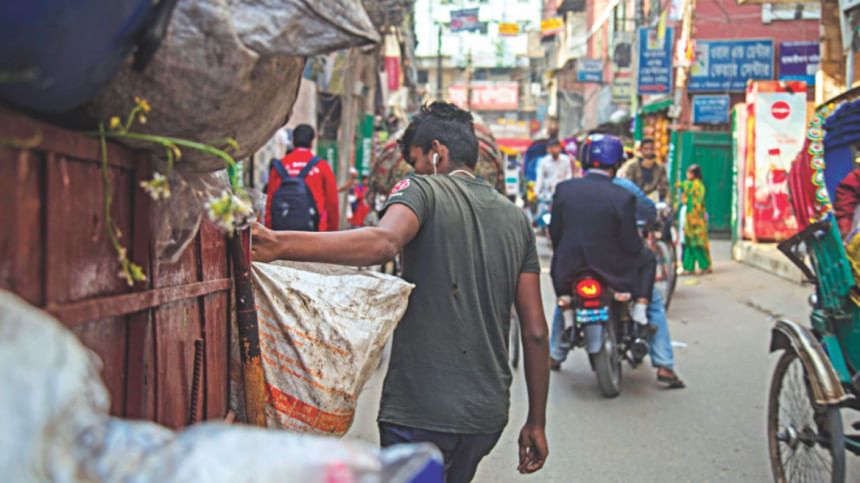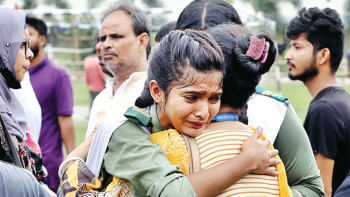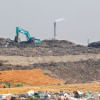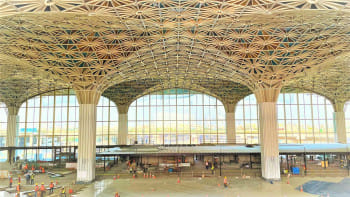Don't let our children grow up amid garbage

Every morning in Dhaka, waste-carrying vans rumble past homes and shops, collecting what we discard. Behind those familiar vans, there are children in rubber boots too large for their feet, children with bandaged fingers, coughing through the stench. Children who have never seen the inside of a classroom.
Recently, The Daily Star published a report titled "Childhood buried in trash," and the data was no less than shocking. The correspondent visited five Secondary Transfer Stations (STSs) across Dhaka, where household waste is temporarily dumped before being moved to landfills. In every site, there were underage workers, some not even teenagers, sorting rotten waste and breathing toxins with practically no safety gear.
The Dhaka South City Corporation has 66 STS units, while Dhaka North has 53. Nearly all are managed privately, not directly by the city corporations. This arrangement allows everyone, from officials to outsourcing firms, to wash their hands of responsibility. Because after all, the children are not "officially" hired. And so, the real number of children working in such places is unknown as there is no official data. But they are there, we pass by them every day, but we rarely ask why.
Most of these children come from urban slums or rural districts. Robin, now 18, dropped out of school when he was a Class 5 student; he now works at two STS sites in Kalabagan and Dhanmondi. Shadhin, 13, came from Sherpur and earns Tk 6,000 a month, sending part of it home and using the rest to feed himself.
Some of these children are filling in for sick parents, while some are sole breadwinners. But none of them should be.
The 2022 National Child Labour Survey, conducted by the Bangladesh Bureau of Statistics with support from the International Labour Organization, found that 35.4 lakh children between the ages of 5 and 17 years are economically active. Of them, 17.8 lakh are trapped in child labour. Nearly 10.7 lakh children are involved in hazardous work that is illegal for anyone under 18 years of age, according to Bangladeshi law. These aren't faceless numbers. These are the children who scrub the dishes at roadside restaurants, who work with dangerous tools at workshops, and who collect our garbage.
Families don't send their children to work because they want to. They do it because poverty is ruthless. They have to decide to rob their children of a childhood because school doesn't always put food on the table, because when rent is due and rice is running out, the cost of surviving today outweighs the promise of tomorrow.
We have allowed these children to become invisible. The laws exist only on paper.
Bangladesh passed a National Child Labour Elimination Policy in 2010, followed by a National Action Plan for the Elimination of Child Labour in 2021, to eliminate hazardous child labour. But the country still has no standalone child labour act.
Several sections of the Bangladesh Labour Act, 2006 ban hazardous child labour. Yet, children continue to be exposed to used needles, broken glass, industrial toxins, and medical waste while collecting garbage. These exposures lead to chronic respiratory issues, skin diseases, and dangerous infections like hepatitis B, tetanus or even HIV. For these kids, injury is routine, immunity is compromised, and the repercussions are lifelong. We can't call this neglect anymore. It is outright abandonment.
It is high time we stopped drafting policies and started enforcing the law because we need real legal consequences for employers, city contractors, and guardians who knowingly endanger children. While accountability must be ensured, the state must invest in meaningful social protection for low-income families: free school meals, conditional cash transfers, and vocational training for parents. A small subsidy can be the difference between a child going to school or sorting trash.
And finally, we, the people, must open our eyes. Behind clean streets might be a child we have trained ourselves not to see. The streets might be clean, but is our conscience clean enough?
Naziba Basher is a journalist at The Daily Star.
Views expressed in this article are the author's own.
Follow The Daily Star Opinion on Facebook for the latest opinions, commentaries and analyses by experts and professionals. To contribute your article or letter to The Daily Star Opinion, see our guidelines for submission.

 For all latest news, follow The Daily Star's Google News channel.
For all latest news, follow The Daily Star's Google News channel. 










Comments